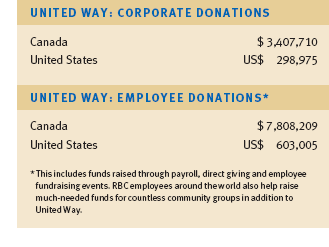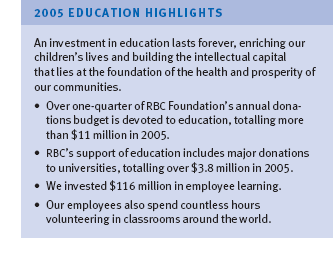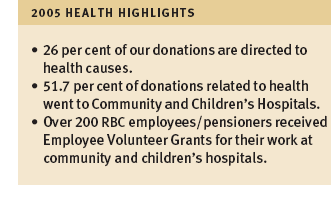|
 |
      |
|
 |
| |
 |
|
 |
CIVIC CAUSES
 Support for United Way Support for United Way
RBC Financial Group is the largest private sector contributor to United Way in Canada, where we are one of only 53 organizations that contributes over $1 million annually. We also have the largest private sector employee giving campaign in Canada, with nearly $8 million contributed through payroll deduction, direct giving and employee-driven fundraising events. In 2005, we also seconded, or loaned, 15 employees to work full-time on local United Way campaigns.
Disaster relief
When disaster strikes, people want to help. That was certainly the case, time and again in 2005. RBC did its part through direct contributions on behalf of our clients and employees, and by opening our branch network to collect donations from the public, including:
| • |
A donation of $250,000 to South Asian tsunami relief efforts, including a matching challenge to all employees worldwide and to the Canadian public. RBC’s corporate donation included $50,000 toward the future resettlement in Canada of immigrants from affected areas, especially those from Sri Lanka. Through our Canadian branch network, $2.557 million was collected from the public; |
| • |
A donation of $250,000 to the Red Cross Hurricane Katrina relief fund, including $125,000 to match our employees’ contributions, in addition to accepting public donations at our branches across Canada, as well as RBC Centura branches in the U.S. southeast; and |
| • |
$125,000 was provided through a direct corporate gift and employee matching gift to the Canadian Red Cross to support the South Asia earthquake campaign, in addition to accepting public donations at our branches across Canada. |
As a matter of course, RBC supports public campaigns run by the Canadian Red Cross by opening our branch network to collect public donations, such as for the Alberta Flood Relief campaign in 2005, to which RBC also donated $25,000. After Hurricane Juan hit the Atlantic coast in 2004, RBC committed $75,000 over three years to the Red Cross Atlantic Division’s Disaster Awareness Campaign.
YOUTH AND EDUCATION
Keeping kids in school
| • |
In 2005, RBC invested $1.7 million with 60 of Canada’s top community-based after-school programs, bringing our total funding in this area to $10.5 million since 1999. These programs have provided 5,500 children with opportunities to build social skills and self-esteem through structured activities in safe environments. |
| • |
In 2005, RBC Centura launched Invest in Success, a campaign to raise public awareness and support for Communities In Schools (CIS), a not-for-profit organization that helps students across the United States stay in school. |
| • |
RBC supports Junior Achievement (JA), an international organization that provides students with a first-hand glimpse into the world of business and entrepreneurship. |
In Canada alone, 803 employee volunteers invested 12,226 hours delivering JA programs, such as a powerful seminar called The Economics of Staying in School. In 2005, RBC announced a gift of $150,000 over three years to refresh the tools and materials to support this program. RBC also supports JA’s Diversity In Action program.
| Towards higher education |
| • |
RBC provides products to help parents finance a child’s education. The RBC Target Education Funds are innovative solutions that offer investment growth potential up-front to help meet the rising costs of tuition and become more conservative as the child approaches college or university age. Through the RBC Rewards program, RBC Royal Bank Visa cardholders can exchange their points for a cash contribution into an RBC Registered Education Savings Plan. |
| • |
RBC Royal Bank and RBC Centura provide a great deal of information on how to finance a post-secondary education. Visit rbcroyalbank.com and rbccentura.com. |
|
 |
| • |
RBC administers a limited number of scholarships, including:
| – |
The RBC Scholarship Program for the children of employees; |
| – |
The RBC Medical and Dental Student Scholarship, available to students in Canada who are beginning their studies and demonstrate an exceptional quality of care and community involvement, as well as financial need; |
| – |
RBC Royal Bank Financial Life Skills Scholarship; and |
| – |
A number of scholarships through not-for-profit organizations and post-secondary institutions, such as The RBC Investments Scholarship at the George Brown College School of Business in Toronto, where RBC advisors teach the certification program, and top students are offered employment with RBC. A similar scholarship is offered at Memorial University in Newfoundland. |
|
| • |
RBC funds scholarships with not-for-profit partners as well, such as: |
| |
| – |
A scholarship at the University of Manitoba to encourage Aboriginal students to study engineering; and |
| – |
scholarships through the United Negro College Fund (UNCF) for study in health-related fields at historically black colleges and universities. We also announced a significant partnership with the UNCF Special Programs Corporation to support community-based service and service learning programs. |
|
RBC is committed to fostering competitiveness and prosperity by funding targeted post-secondary programs related to technology, innovation and business management, such as:
| • |
A $350,000 donation to UNB Fredericton’s Centre for Financial Studies (CFS) to support the award-winning Student Investment Fund program. This will give UNB business students real investment experience in Canada’s growing financial services industry; and |
| • |
A $600,000 donation to Seneca College’s Centre for Financial Services, which now offers an applied degree that provides students with critical knowledge and advanced practical skills for careers in the field of financial services. |
Into the workforce
| • |
RBC is a founding partner of Career Edge, an organization that provides internship opportunities for Canadian graduates who have little to no work experience in their field. RBC hosted five Career Edge interns in 2005, and through our Associate Host program, we also placed seven interns with our small business and not-for-profit clients. RBC also supports Career Bridge for immigrants and Ability Edge for people with disabilities. |
| • |
RBC was one of the first corporate supporters of Pathways to Education, an innovative program that provided one-on-one support to every student in one of Toronto’s economically disadvantaged communities, over their full four years of secondary school, starting in 2001. The program has had stunning success. Of the 87 youth who started the program the first year, 37 just graduated, with 33 continuing to college and university. The rest are returning for one more semester of secondary school, with a 90 per cent graduation rate expected. In 2005, 725 students were part of the program. In 2005, RBC offered six summer internships to Pathways graduates, and we became the sole provider of recruitment services to Pathways graduates by offering work preparation seminars, resume-writing experience and conducting mock interviews. |
For more information on how RBC supports youth and education, visit rbc.com/community.
| PEOPLE WITH DISABILITIES |
|
ABORIGINAL PEOPLES |
In April 2000, RBC released an economic outlook for people with disabilities. “Despite an incredible run of economic growth that has pushed Canadian and American unemployment rates to their lowest levels in over two decades,” the report stated, “individuals with disabilities have participated in this upswing only to a minor extent. Deep inequalities continue to exist that result in people with disabilities generally suffering from missed opportunities throughout their lives.” RBC believes that full inclusion is in the best interests of our communities and our countries, and we support programs that help create employability and remove barriers to education for people with disabilities:
| • |
RBC donated $20,000 to Reaching E-Quality Employment Services for its WORKink Manitoba project, $5,000 to BC’s Neil Squire Society’s EmployAbility Program, and $25,000 to the Richmond Committee on Disability Project, to help people with disabilities hone their job searching skills, develop skills for the workplace and find long-term employment. |
| • |
We support research that will help advance people with disabilities. We continue to support the Canadian Centre on Disability Studies in Winnipeg, Manitoba, through the RBC Research Chair. In 2005, we also donated $30,000 to help the Centre provide grants for disability-related research projects at the community level. |
| • |
In Toronto, the Ryerson RBC Foundation Institute for Disability Studies undertook a project to research employment and employability of people with disabilities within the financial services industry. |
|
|
In 1997, RBC released a landmark report on the state of Aboriginal economic development. “The economic state of Canada’s first peoples is deplorable, and the costs of the status quo to the public purse are high and rising,” the report stated. “This is a matter of great national urgency, and the business community should lend its support.”
With Canada’s Aboriginal population growing at about twice the rate of the Canadian population, and with over half the Aboriginal population under the age of 25, RBC is committed to supporting education and job creation for Aboriginal youth.
| • |
Since its inception in 1992, RBC’s Aboriginal Student Awards Program has provided 64 scholarships totalling $628,000. Five students received awards in 2005, selected by an independent committee of academics from the Aboriginal community. |
| • |
RBC donated $20,000 to the Dominion Institute to support its Aboriginal Youth Writing Challenge, encouraging Aboriginal high school students to write a work of fiction about an event in Aboriginal history. RBC’s contribution will help the Institute to promote the Writing Challenge to Aboriginal communities and fund a one-hour documentary profiling Aboriginal writers. |
| • |
RBC donated $40,000 to the Historica Foundation’s heritage programs for Aboriginal students, developed with First Nations educators. The program inspires young people aged 9 to 14 to share their own history with students in the rest of Canada. Over 238,000 students participated in 2005. |
|
ARTS AND CULTURE
Vibrant communities depend on an environment that celebrates arts and culture. RBC supports a wide range of initiatives that contribute to the cultural fabric of our communities.
| • |
The RBC Canadian Painting Competition was established in 1999 to nurture Canadian visual artists in their early career. The competition has the largest prize disbursement for a painting competition in Canada, with one national prize of $25,000 and two honourable mentions receiving $15,000 each. The artwork of semi-finalists is shared with the public on a tour of the country, and winning works become part of RBC’s own art collection. |
| • |
RBC’s art collection was established in 1929 to encourage and support Canadian artists. Today, our collection contains 4,000 distinguished paintings, prints and sculptures, displayed in RBC locations around the world. |
| • |
RBC has a long tradition of supporting emerging artists. In 2005, we invested $280,000 in young artists through apprenticeship and internship programs with organizations such as the National Ballet, the Canadian Opera Company, Dance Saskatchewan, the Shaw Festival and the Royal Conservatory of Music. |
| • |
RBC is committed to enhancing access to the arts for people with disabilities. For example, we support Corpuscule Danse, an inclusive dance company in Quebec that uses performers with disabilities as well as those who are able-bodied, and an Art Studio & Cooperative in British Columbia, providing skill development to artists with disabilities. |
| • |
In 2005, RBC supported regional arts initiatives across North America, such as a pledge of $1 million over six years to the Banff Centre for Continuing Education to support its Youth Excellence Scholarship, Banff International String Quartet Competition and the Banff Summer Arts Festival, as well as a gift of $47,500 to the Atlantic Ballet Theatre in Moncton, New Brunswick. |
| • |
RBC Dain Rauscher sponsored “The Human Touch: Selections from the RBC Dain Rauscher Collection,” an art tour featuring 39 works that were displayed in cities across the United States. |
For more on RBC’s support of the arts, visit rbc.com/community.
|
|
 |
| |
 |
|
| |
AMATEUR ATHLETICS
RBC supports amateur athletes of all levels, from those who take part in community sports to those who dream of Olympic gold.
Canada's Olympic Team
| • |
RBC was chosen as the Premier National Partner in the banking category for the 2010 Olympic and Paralympic Winter Games, Vancouver, BC with Canadian Olympic Team sponsorship rights for all Games from 2006 to 2012. RBC’s total commitment of $110 million over the next eight years included a cash contribution of more than $70 million. Other support includes banking services, athlete and amateur sport investments, support for the Paralympics, First Nations’ community development programs and Olympic brand marketing support through the RBC network. RBC is the longest-serving corporate sponsor of the Canadian Olympic team, since 1947. |
| • |
RBC employs current and retired Olympic and Paralympic athletes through the RBC Olympians Program, offering flexible work arrangements so that athletes can make time for training and competition. The RBC Olympians act as community ambassadors, visiting schools, community groups, clients and employees. The program also provides valuable work experience to help athletes prepare for life after sport, with RBC Olympians working in various departments across RBC. Since its launch in 2002, the RBC Olympians Program has employed more than 35 athletes and several have gone on to full-time careers with RBC. |
| • |
Access to sport: RBC is a founding sponsor of Special Olympics Canada, helping to provide sport training and competition opportunities for 28,000 athletes of all ages and abilities. RBC employees volunteer their time as coaches and fundraisers while the RBC-sponsored Sport Celebrities Festival raises more than $1 million annually. |
Hockey
| • |
RBC has been a Premier Sponsor of Hockey Canada since 1995. In addition to supporting Canada’s Men’s and Women’s National and Olympic teams, RBC is title sponsor of the National Junior A Championship, the RBC Royal Bank Cup, held in Weyburn, Saskatchewan in 2005. |
| • |
In 2005, Saskatchewan and Alberta commemorated their 100th anniversaries, and RBC celebrated by sending treasures from the renowned Hockey Hall of Fame on the RBC 100 Years of Hockey exhibit, touring local communities in both provinces. |
| • |
In its second year, the RBC Local Hockey Leaders program recognized “behind the scenes” volunteers who dedicate their time to supporting grassroots hockey in their community. Thirteen regional winners were recognized in the Hockey Hall of Fame for their efforts, with RBC donating $10,000 to minor hockey in each of their communities. |
| • |
In 2005 RBC awarded ten scholarships to players from each of the regional leagues of Canada’s Junior A hockey, to be applied to post-secondary education. |
| • |
RBC sponsored the XI FINA World Championships (aquatics) in Montreal, Quebec, where RBC Olympian Ann Dow captured a bronze medal with Team Canada. |
For more on how RBC supports amateur sport, visit rbc.com/sponsorship.
HEALTH AND WELLNESS
RBC is committed to health and wellness, with an emphasis on supporting research and programs that improve community services and enhance quality of life. Our major gifts in 2005 included:
| • |
$2 million to the First Office of Injury Prevention at Sunnybrook and Women’s College and Health Sciences Centre in Toronto, Ontario; |
| • |
$350,000 to the STARS Human Patient Simulator program, a mobile education unit that tours Alberta, parts of British Columbia, the Northwest Territories and northern Montana; |
|
 |
| • |
RBC supported Quebec’s first respite home and pediatric palliative care facility with a $100,000 donation to the Lighthouse; |
| • |
$500,000 to the Queen Elizabeth II Health Sciences Centre in Halifax. This donation will facilitate further growth of the Multi-Organ Transplant Program and help to fund endowed chairs; and |
| • |
$350,000 to the University of Regina to establish the RBC Research Fellowship Program on Aging and Health. |
Our employees also generously volunteer their time to health care organizations and charities around the world. Here are some highlights from 2005:
| • |
Every year the Juvenile Diabetes Research Foundation hosts the Ride for Research event in communities across Canada, in which teams on stationary bikes race against each other and the clock. In 2005, 1,760 RBC employees across Canada raised $470,000, with RBC also donating close to $134,000 to the cause; |
| • |
Terry Fox Run for Cancer Research: 2005 marked the 25th annual Terry Fox Run, with hundreds of RBC employees, from London, Ontario to London, U.K. taking part in what is considered the largest single-day fund-raiser for cancer research in the world. RBC Royal Bank branches once again accepted pledge sheets from runners; and |
| • |
In 2005, 181 RBC employees and family members in 18 communities across Canada took part in the Multiple Sclerosis Society’s walks and bike rides, raising $86,400, with 25 employees helping count money raised from events held across Ontario. RBC also hosted a Charity Golf Tournament in Toronto, with 450 participants, 100 sponsors, and 70 volunteers raising a record-breaking $350,000. |
For more information on RBC’s support for health, visit rbc.com/community. |
|
|
|